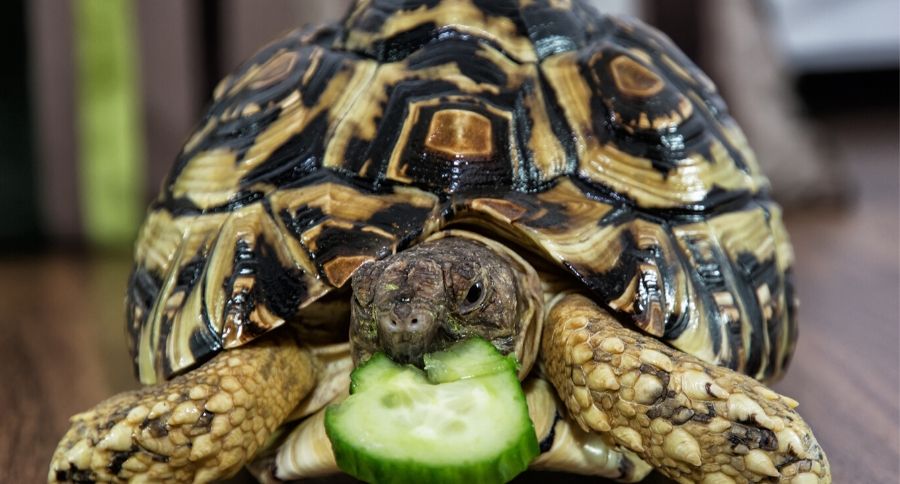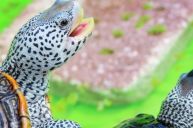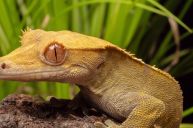The leopard tortoise is the second largest tortoise native to Africa. Adult leopard tortoises measure from 10-18 inches long depending on the geographic origin and subspecies of the tortoise. They also live between 50 and 100 years in the wild!
They're known to be slow and quiet but somewhat high-maintenance.
Yet, do they make good pets? This tortoise needs a lot of space and has specific needs.
Overall care
The Chicago Exotics Animal Hospital tells us that this animal will grow to be a large and long-lived pet that will need large amounts of room and food to remain healthy in your home.
Remember that calcium supplements need to be given twice a week!
The experts recommend adopting a juvenile or an adult from a reptile shelter or supporting a local reptile sanctuary.
Behavior and diet
The Leopard tortoise has three defense mechanisms. The first is to retract the limbs under the shell. The second is to hiss loudly. If the tortoise is picked up, it will urinate copiously which is the third defense mechanism.
The Chicago Exotics Animal Hospital recommends the primary portion (85 percent) of the Leopard tortoise diet should be grass and hay high in fiber. Grasses, weeds, leaves and flowers are essential to good health.
- Fiber deficiency leads to metabolic bone disease and diarrhea while also making them susceptible to parasites.
- A pasture of grass, dandelion, herbs, and clover outdoors is the best option for these animals.
- If a pasture is restricted due to size, fresh-cut works as well.
- Orchardgrass/hay, timothy grass/hay, and Bermuda grass/hay are excellent especially during those winter months when the tortoise may be housed inside.
Leopard tortoises should be given as much opportunity to graze outdoors as possible!
Housing a leopard tortoise
The preferred setup is outdoors!
Reptile Magazine recommends an outdoor enclosure but if you live in a climate too cold to keep your tortoise outdoors then you can house them indoors.
"However, if you live in a climate too cold for such an enclosure, you may house the tortoise indoors. A pair of leopard tortoises can be kept in a 10 foot by 10-foot pen. The walls should be at least 18 inches high and may be made of wood, block or other material that prevents the tortoise from seeing through the wall."
Sun exposure is crucial for leopard tortoises, so make sure they have ample basking spots where they can soak up the vitamin D for a healthy shell.
If your leopard tortoise is housed indoors, according to The Spruce Pets, and is not being exposed to direct sunlight, a UVA/UVB light is vital. This special light and heat lamp should be on for a 10-to-12-hour cycle daily and not filtered through glass or plastic to mimic direct sunlight.
You must make sure there is some bare ground in his pen; tortoises dig in the dirt to lay eggs.
After reading some of these details in the care guide, is this species of tortoise still one you're interested in? These large tortoises are a lot of work!
What about hatchlings?
Hatchlings can be kept in a 10-gallon tank and increased in size from there. Remember, as your tortoise grows he will need a custom enclosure! This is not a species that can be kept in aquariums all their lives.
A little history?
Leopard tortoises also do not hibernate since they are from climates that are warm year-round, as they're native to South Africa, Ethiopia and Somalia. But their metabolism and energy level may slow down during cooler months.
Go to a rescue or sanctuary as mentioned previously and don't go through someone in the pet trade. The scientific names for Leopard tortoise are Stigmochelys pardal, Stigmochelys pardalis pardalis, Stigmochelys pardalis babcocki if you need to refer to these while talking with experts.
They always need fresh water so plan to change it daily. Also, don't forget about their daily calcium and vitamin D3 supplements in addition to the recommended tortoise food. They're herbivore grazers after all.
Other tortoises to consider are Sulcata tortoises and African tortoises.
What is the age of the oldest pet you've ever lived with? Please leave us a comment below!




